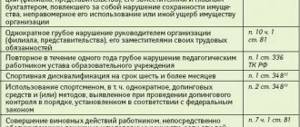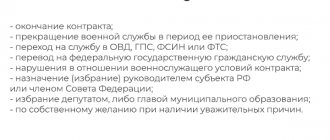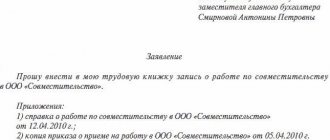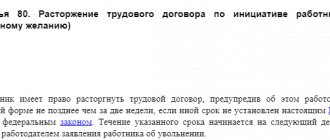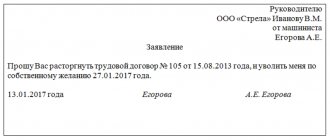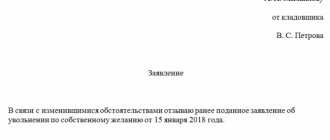After reaching retirement age, many pensioners decide to continue working.
There are many reasons for this, not the least of which is the low level of pension provision in our country.
The average salary is much higher than the average pension, so people do not want to lose income. However, sooner or later you still have to quit, since your ability to work becomes worse over the years. But do they need to work for two weeks?
When an employee has the right to retire
The conditions for acquiring the right to a pension are formulated in Art. 8 of the Federal Law of December 28, 2013 No. 400-FZ. These include:
- reaching the established retirement age;
- having at least 15 years of insurance experience;
- individual pension coefficient is not lower than 30.
IMPORTANT!
Starting from 2021, there is a gradual increase in the retirement age (see on the Pension Fund website).
In addition, it is necessary to take into account that there are categories of employees who are provided with a preferential , and they can retire earlier . These include (Article 30 of Federal Law No. 400-FZ dated December 28, 2013):
- citizens working in the regions of the Far North and equivalent areas - if they have worked in them for 15 or 20 years, respectively, and have a total insurance experience of 20 or 25 years. For them, the retirement age has been reduced by 5 years .
- teachers, doctors and creative professionals also have the right to reduce the retirement age;
- workers employed in harmful and dangerous working conditions, as well as workers at work according to the Lists of Professions approved by Resolution of the Cabinet of Ministers of the USSR dated January 26, 1991 No. 10.
If the specified conditions are met, the citizen has the right to resign due to retirement simply by writing a corresponding application.
What are the advantages of pensioners
According to the provisions of the current Labor Code, pensioners are equal in rights and responsibilities to all other employees (Article 3 of the Labor Code of the Russian Federation).
But in some cases, retirement age guarantees certain benefits at work.
- According to the law, age cannot be a reason for refusal of employment (Article 64 of the Labor Code of the Russian Federation).
- A retired WWII veteran, if he continues to work, can choose the time for his vacation (Clause 1, Article 15-16 of Federal Law No. 5 of January 12, 1995).
- If desired, an employee of retirement age can take additional unpaid leave of up to 14 days.
- Working pensioners are exempt from paying property tax.
- Older employees receive certain preferences when purchasing vouchers to sanatoriums and other health institutions.
It is important to know what mistakes to avoid with retired employees
Stages of voluntary dismissal of a pensioner
Care due to retirement is not specified as a separate basis for termination of employment relations with an employee under the Labor Code of the Russian Federation. If an employee decides to leave the company upon reaching retirement age or after that, this must be done as a voluntary .
no significant differences from the standard procedure . An exception is the need to work off, which depends on the wording in the application and whether the pensioner has already left work on a similar basis.
Can a pensioner resign from work of his own free will without working off?
In the Labor Code of the Russian Federation, which regulates all significant relations between an employee and an employer, the term “working off” cannot be found . It only states the need to give notice of dismissal to representatives of the organization where he works no less than 14 calendar days in advance. In other words, the employee writes a corresponding application 2 weeks in advance. However, the word "working off" is firmly rooted in the lexicon, so it will be used here in the appropriate context.
Reference! 2 weeks is the maximum period of work. In practice, an employee can reach an agreement with his superiors and quit much earlier.
Pensioners who work after reaching the appropriate age carry out their labor function on a general basis, without any significant benefits and preferences. However, upon dismissal, they have the right not to work. In other words, pensioners can write a statement and leave work literally the very next day . And this will not be a violation of labor laws.
Procedure for filing a resignation letter
is not fixed anywhere ; it is drawn up in any form. It should contain the following information:
- FULL NAME. and the position of the person leaving;
- the date that will be his last working day;
- grounds and reasons for dismissal.
The basis for leaving will be the same – “at your own request.” But the reason may either not be mentioned at all, or sound “in connection with retirement.”
In the first case, the deadline for dismissal of a pensioner at his own request is established by Part 1 of Art. 80 of the Labor Code of the Russian Federation, taking into account the employer’s warning at least 2 weeks in advance: he must work them out before leaving.
If the reason for dismissal is retirement, then according to Part 3 of Art. 80 of the Labor Code of the Russian Federation, it makes the employee’s continuation of work in the company impossible . And he can be fired without working off . In this case, the employment relationship must be terminated on the day specified in the application.
SAMPLE PENSIONER'S APPLICATION FOR DISMISSAL
IMPORTANT!
According to Part 1 of Art. 8 of Federal Law No. 400-FZ of December 28, 2013, an employee retires 1 time . You cannot resign on this basis .
If the employee’s work history already contains information about dismissal due to retirement, he cannot leave a second time on the same basis. When the application repeatedly states the same circumstance of dismissal, it is better to ask the employee to rewrite it, since he still needs to work for 2 weeks.
Employer's liability
We draw the attention of heads of various institutions to the fact that the rights of a pensioner who terminates an employment contract at his own request must be respected without fail. Otherwise, the employer may be subject to certain sanctions and criminal liability.
The judicial authorities may find the manager guilty in the following cases:
- deviation from the instructions regulated by the legal framework.
- Indication of false information in documents.
- Gross violations of the dismissal procedure.
- Incorrect documentation and lack of necessary papers.
- If the employer violated the deadlines for dismissing the pensioner at his own request, which were prescribed in the application, as well as the deadlines for completing the documentation.
- Refusal to issue monetary compensation upon dismissal of a pensioner at his own request, which is provided for by law.
- Loss of a work book, as well as failure to provide certain documents that must be issued on the day of dismissal.
- A number of other violations depending on the specific situation.
Thus, by following the procedure for dismissing a pensioner at his own request without working time and following the advice of this article, the chances of breaking the law will be reduced to zero. Good luck!
The procedure for issuing a dismissal order
no standard form for an order to dismiss a pensioner ; it can be arbitrary.
In practice, companies most often use form No. T-8.
Even if a company decides to develop its own template, it must include:
- FULL NAME. and the position of the dismissed employee;
- date of termination of the employment relationship;
- the basis for dismissal - clearly indicate in accordance with the wording given in clause 3, part 1, art. 77 Labor Code of the Russian Federation;
- be sure to make a reference to the employee’s application as a basis, indicating his details.
IMPORTANT!
The employee must be presented with the order upon signature. If this fails, a corresponding note should be made on the order.
SAMPLE ORDER FOR DISMISSAL OF A PENSIONER
Grounds for dismissal under the Labor Code
In Art. 81 of the Labor Code of the Russian Federation presents a rather impressive list of situations in which an employer can terminate a contract concluded with an employee. This can happen for the following reasons:
- In case of liquidation of an enterprise or individual entrepreneur;
- When staffing or the number of workers is reduced;
- If the employee does not correspond to the position to which he was assigned;
- As a result of a change of owner (applies to the heads of the organization and the chief accountant);
- Due to the employee’s regular evasion from performing his functional duties;
- Due to gross violation of labor discipline (for example, absenteeism, drunkenness in the workplace, etc.);
- Illegal employment, etc.
Rights and guarantees of elderly people: can this be done?
Current legislation does not provide for pensioners any privileges that would protect this category of workers during layoffs. An employer has the right to dismiss both an able-bodied person and a person of retirement age . The most important thing is to have legal grounds for this.
However, one important nuance cannot be ignored. In Art. 179 of the Labor Code of the Russian Federation states that when selecting candidates for reduction, it is necessary to take into account their productivity and qualifications. It follows that employees who have achieved better results in their work have a preferential right to retain their place. Moreover, most of these people are found among pensioners.
You can also find out who cannot be laid off when reducing staff by reading here.
For elderly people, a pension is provided, which is issued upon reaching a certain age (for men - 60 years, for women 55 years). This right is enshrined in Art. 7 of the Law “On Labor Pensions in the Russian Federation”.
How to make an entry in a work book and personal card
The entry in the work book is made in strict accordance with the wording of Art. 77 Labor Code of the Russian Federation. At the same time, they additionally indicate the reason - “in connection with retirement” (clause 5.6 of the Instructions, approved by Resolution of the Ministry of Labor of Russia dated October 10, 2003 No. 69).
Also, information about dismissal should be entered into the register of information on labor activity (Part 1 and Article 66.1 of the Labor Code of the Russian Federation).
In the SZV-TD form, you must similarly indicate that the reason for dismissal was retirement (Part 5, Article 84.1 of the Labor Code of the Russian Federation).
On the last page of the employee’s personal card in form T-2, a note about dismissal is made, which must completely repeat the wording from the order, include its details and the date of termination of the employment relationship.
If an employee receives a work book, he must sign the personal card.
Dismissal of a pensioner due to a reduction in the number of employees
At a time when any changes in the staffing table occur at an enterprise, the question automatically arises as to whether it is possible to dismiss an individual who has reached retirement age, justifying this action by reduction.
If you turn to the Labor Code of the Russian Federation for help, in Article 77 you can find a list of grounds that are generally considered legal for terminating an employment contract.
The fourth part of this legislative act confirms that an employee can be dismissed at the initiative of the employer. Further opening Article 81 of the current code, which contains a list of cases giving the manager the right to cancel an employment agreement on his personal initiative, it becomes clear that staff reduction is a completely acceptable reason.
Thus, it is still possible to fire a pensioner due to a reduction in staff, but at the same time, the manager must respect the preferential right to retain a job for certain groups of employees, which are listed in Article 179 of the Labor Code.
If the employer decides that it would be most advisable to lay off an employee of retirement age, then it is necessary to remember that this individual has not only a preferential right, but also certain guarantees, benefits, and rights.
When dismissing a pensioner, you need to consider a number of the following factors:
- preemptive right. Employers are required to primarily take into account the length of service and qualifications of employees.
As a rule, due to their long work experience, retirees are practically irreplaceable employees and, as a result, have a preferential right to remain at work. - Guarantees. If an individual stops working at an enterprise due to a decrease in the number of employees, then he is guaranteed payment of severance pay from the manager.
And if a laid-off employee does not find a new job, then he is officially considered unemployed and can count on monetary compensation intended as unemployment benefits.Guarantees also include an offer from an employer to an employee to take up some other job position, as well as the provision of an additional financial payment in the event of an immediate layoff that occurs without observing the notice period for the upcoming dismissal.
The full list of guarantees can be found by opening Article 180 of the current code.
- Privileges. It's no secret that pensioners are considered a preferential category of the population.
In this regard, for them the period for receiving severance pay provided by an individual during the period of employment is three months, while for other employees it is only two. However, in order to receive compensation for the third month, you need to contact the employment service with a request to accrue funds.
What documents are issued on the last working day?
When retiring an employee, he must be given a standard package of documents on his last working day. It includes:
- work book or form STD-R, if the book is not kept on paper;
- extracts for the employee from the forms SZV-M, SZV-STAZH, DSV-3, RSV (section 3);
- income certificate (2-NDFL);
- a certificate in the form in accordance with Order of the Ministry of Labor No. 182n - on income for 2 years for calculating sick leave;
- certificate of average earnings for 3 months.
Is it possible to fire pensioners when reducing staff?
A legal entity or entrepreneur without such education has the right to reduce the number of specialists when this is truly justified. In this case, certain positions or entire departments may be excluded from the staffing table, or the number of specialists working in the same position may be reduced.
The section of the Labor Code on guarantees for certain categories of specialists contains several provisions prohibiting the layoff of employees, but working pensioners are not guaranteed this right. But such persons have their own advantages and at least general guarantees for dismissal at the initiative of the employer on the basis in question.
Do pensioners have preferential rights?
In the event of a decrease in the number of specialists, a legal entity or individual entrepreneur is obliged to comply with the requirements of the law regarding who is dismissed first.
Attention! Pensioners themselves are not mentioned as those who have the privileges to continue working in the organization in relation to other persons.
However, the general rule obliges the priority to retain in their position the person who demonstrates greater efficiency, which is characterized by 2 factors:
- Specialist qualification.
- Labor productivity of dismissed persons.
Due to this norm, older people often outperform younger professionals because they have higher qualifications, and due to their extensive experience, their productivity is higher.
Only if it is impossible to identify a more efficient specialist, other grounds are used on which the pensioner, among other things, can guarantee himself the retention of his place.
These may include the following reasons:
- having at least 2 dependents;
- if there is no other income among family members;
- in case of injury to a person at work.
If a person of pre-retirement age has been subjected to unreasonable layoffs, the employer will be held criminally liable.
Guarantees from the employer
When implementing this procedure, the legislator imposes the obligation on the employer to provide him with the following guarantees:
- warn him in writing (the period allotted for this is equal to or more than 2 months);
- offer unfilled positions in the relevant area (first of all, the job that corresponds to the person’s qualification level is offered, if he disagrees, a lower one is offered);
- pay severance pay, the amount of which is assumed to be equal to the person’s average monthly earnings.
All these guarantees are provided regardless of the category of persons being dismissed.
What payments are due?
In addition to the guarantees described above, depending on the specific circumstances, a laid-off retired employee may be entitled to other benefits. These include:
- payment of the average salary per month in situations where a person was unable to find a job under an employment contract (EA) within 2 calendar months after dismissal;
Reference! The law also provides for a similar payment for the 3rd month when the dismissed person registered as a job seeker with the relevant government agency. The decision in this case is made by the government agency. Practice has proven that a pensioner can also receive this payment if he is registered with an employment center as a person looking for work, although he cannot apply for benefits.
- larger payments, if such a benefit is provided for in the TD or collective agreement;
- offer of work in vacant positions in another area, if this is provided for by local regulations or an agreement with a specialist;
- It is impossible to apply this procedure if the person is on vacation or is temporarily disabled.
Also, one of the additional benefits can be the opinion of the trade union committee regarding its members. To dismiss such persons, it is necessary to find out the position of the trade union committee of the enterprise.
For more information about payments, watch the video:
What payments are due to a pensioner upon dismissal?
As a general rule, dismissal with retirement must be completed by the transfer of all payments due to the employee. This:
- payment at a salary/tariff rate/piece rate for time worked, work performed;
- incentive payments - if the employee is entitled to this according to internal regulations;
- compensation for unused vacation days;
- other payments due to the pensioner according to the company’s policy and enshrined in its local regulations. It could be checkmate. assistance, additional severance pay.
The specified amounts must be transferred to the employee’s account or issued in cash from the cash register on last working day.
Read also
25.05.2020
Payments and compensations
If a pensioner resigns of his own free will, by agreement of the parties, or upon retirement, the employer must pay him:
- wages for the time actually worked in the month in which the employment relationship is terminated;
- compensation for unused vacation, if any in the current working year;
- additional benefits at the discretion of the employer.
If a pensioner resigns due to staff reduction or liquidation of an enterprise, then the employer pays him:
- wages for actual time worked;
- compensation for unused vacation, if any;
- benefits for the first two months after dismissal, for the third - if necessary;
- Additional benefits are paid at the discretion of the employer. The law does not provide for this.
- if the pensioner carried out his labor functions in the regions of the Far North or in areas with a similar status, then the benefit is paid for a period of up to six months.
There are times when the benefit amount may be reduced:
- work of a pensioner in seasonal work;
- refusal to transfer him to permanent work at another enterprise, by agreement between employers.
Privileges and guarantees
When carrying out the procedure for downsizing or liquidating a company, persons receiving state subsidies are entitled to privileges. The employer must provide pensioners with the following guarantees:
- do not discriminate against individuals based on age, provide equal rights to work for older citizens compared to younger employees;
- take into account the qualifications, experience, knowledge and skills, high labor productivity of a pensioner when determining the list of employees subject to personnel reduction;
- provide additional unpaid leave out of turn for up to 2 weeks to a person receiving old-age benefits, upon his request;
- pay all subsidies established by the state when the number of workers in the company is reduced;
- do not force a pensioner to work for the required 2 weeks if the citizen decides to resign of his own free will.
Preemptive right to remain on staff of the enterprise
According to the provisions of the Labor Code of the Russian Federation, an employee receives an advantage when remaining in his position during the procedure for optimizing production at the enterprise, if he is highly qualified and performs duties in accordance with the provisions of the employment agreement. If a person of retirement age is actively working in production and his work is highly productive, then the company management must take these factors into account when compiling a list of employees to be laid off.
- How to disconnect an MGTS phone in Moscow - step-by-step instructions, necessary documents and application form
- How to get rid of fungus
- Mumiyo in tablets
Which pensioners are prohibited by law from being laid off?
People belonging to socially unprotected categories of citizens who have served the Russian Federation and the enterprise have the right to remain in their previous position while minimizing the size of the company for objective reasons. These include the following Russians receiving a pension:
- those who took part in battles on the battlefields of the Great Patriotic War (WWII);
- those who received injuries in the Second World War that led to disability;
- having disabilities due to participation in other battles in hot spots;
- injured during work, but able to perform job functions in accordance with the provisions of the employment agreement;
- providing for minor dependents;
- falling under the definition of a privileged group that is not subject to reduction, in accordance with the provisions of the collective agreement;
- who are guardians of minor children, provided that they are the only employed family members.
Dismissal procedure
Due to the fact that a working pensioner is an ordinary staff member, the dismissal procedure is carried out in accordance with the general requirements of the law.
The actions of the administration represent a certain algorithm, following which many mistakes can be avoided.
- The director of the company, together with the heads of structural divisions, holds a meeting at which an official decision is made to change the staffing table.
- Based on the decision made, the commission members issue an order. The text indicates the need to reduce certain staffing positions, the names of positions, the names of employees and the date of execution of the order.
InformationThe list of those affected by reduction is compiled by the heads of departments, but is approved by all members of the commission, including the director.
- According to the legal framework, employees included in the list are given a written notice of the administration’s intentions 2 months before the date of execution of the order.
- If there are vacancies at the enterprise that correspond to the qualifications of the employee who was laid off, he is offered a new position. In this regard, retirees have priority, because their experience and professional level are of great value to the company.
AttentionOne of the important conditions for the possibility of transfer is good health.
- Simultaneously with notifying the employee of the upcoming layoff, the manager notifies the trade union organization of the upcoming changes, as well as the employment service.
- All employees included in the layoff list are given a written notice against their signature.
- In order for qualified employees, such as retirees, to continue to use their accumulated experience, the administration offers an alternative vacancy. The pensioner confirms his disagreement to renew the employment agreement with his signature in the act, which is drawn up in the event of refusal to accept the administration’s offer.
AttentionHe retains the right to resign early while maintaining benefits for the remaining period.
- Two months after receiving the written notice, a dismissal order is issued. The wording indicates the reason - reduction.
- The dismissed employee is given documents (including a work book) and payment funds. The process of transferring papers and funds is recorded in personnel journals and accounting statements.
Age is not a reason to quit
A person who has reached a certain age has the right to stop working and retire. But the legislation of the Russian Federation also does not prohibit such elderly people from working. Especially if they are full of strength and can fully cope with their work responsibilities.
Despite the fact that due to the pension reform of 2021, the retirement age has been increased (for men - 65 years, for women - 60), it has not become a reason for dismissal. And if the manager nevertheless forced an older employee to terminate the employment relationship without justified reasons, this will be regarded as age discrimination. In such cases, employers are in for big trouble. How to fire a pensioner without violating his rights and legislation?
Can a pensioner be fired due to redundancy?
Information
Until 1992, a labor code was in force, which allowed the enterprise administration to dismiss an employee after his age approached the retirement limit. Based on the new norms regulating the relationship between the employer and employees, the citizen retains the right to work.
Pensioners, like other employees, may be laid off. The dismissal procedure takes place on a general basis. All actions of the personnel department comply with the provisions of legal norms.
| The legislative framework | |
| Name of the law, article number | What is the article talking about? |
| Constitution of the Russian Federation, art. 37 | The article talks about the right of every citizen to work. |
| Federal Law No. 79 (30.12.2015) | A citizen of the Russian Federation who has reached 65 years of age can extend the age limit to 70-75 years by mutual agreement with the employer. |
| Labor Code of the Russian Federation, art. 180 | How is the dismissal procedure for job reduction carried out? |
| Labor Code of the Russian Federation, Article 81 Part 1 Clause 2 | Termination of an employment contract on the basis of staff reduction. |
| Federal Law No. 400 | Having reached the age limit, an employee can continue working without applying for a pension, which provides for an increase in the coefficient when recalculating future benefits. |
| Labor Code of the Russian Federation, art. 179 | The administration has the right to offer another vacancy to the reduced staff unit if the experience and skills of the retiree are valuable and in demand for the enterprise. |
Measures to reduce the number of staff units are most often triggered by the following events:
- modernization of production;
- change in the scope of activity;
- job reductions in order to optimize labor resources;
- reduction in the volume of products produced at the enterprise.
Important
Pensioners who have dependent minor children are not subject to dismissal.
The ban also applies to:
- guardians;
- disabled people of WWII and combat.
We take into account the nuances
The procedure for laying off pensioners who work part-time or are on sick leave at the time of dismissal has a number of features. Moreover, first of all, this concerns compensation that the employer must pay.
If the job is permanent (and combined)
Quite often there are situations when a person has two or more jobs. Moreover, in one place he can be a permanent employee, and in another (or in the same place) - a part-time worker.
In Art. 287 of the Labor Code of the Russian Federation states that citizens carrying out part-time activities also have the right to receive all the guarantees that are due to permanent employees. The only exceptions are those benefits that are provided for persons simultaneously receiving education or working in the Far North.
So, if a part-time worker is laid off, while he continues to work in his main place, then only severance pay is paid as compensation. In this case, the average monthly earnings for the period of employment (2 months) are not saved, since it is considered that the employee is already employed.
Due to sick leave
In Part 6 of Art. 81 of the Labor Code of the Russian Federation states that an employer does not have the right to dismiss an employee on sick leave on his own initiative. The only exception can be the case when the organization ceases its activities. It follows that a pensioner who is absent due to temporary disability can be laid off only after returning to work .
The process itself is no different from the generally established procedure for staff reduction. Management is obliged to notify the sick employee of the upcoming dismissal, as well as offer vacancies.
In addition, there is one more important nuance. If a pensioner falls ill within 30 days from the date of termination of the employment contract, he will have to be paid the appropriate benefit (sick leave). This is written in paragraph 2 of Art. 5 Federal Law of December 29, 2006 No. 255-FZ.




